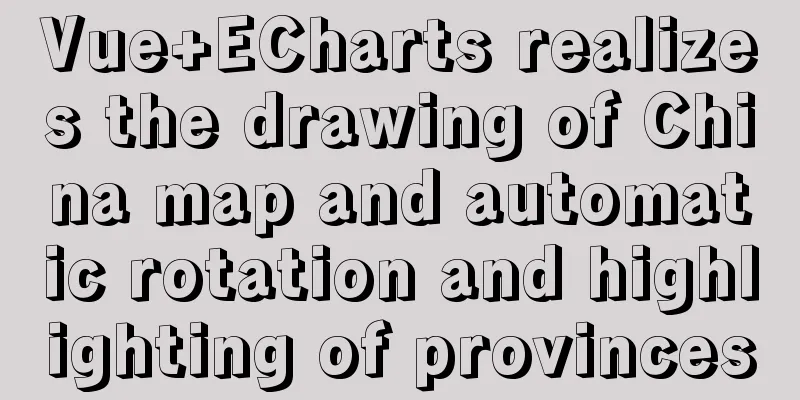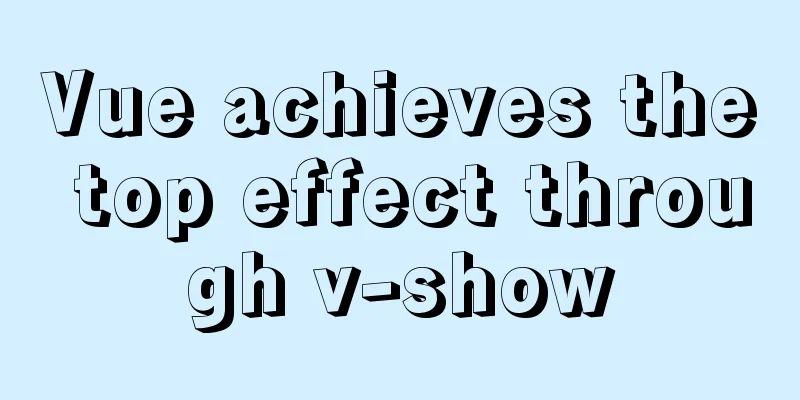Vue+ECharts realizes the drawing of China map and automatic rotation and highlighting of provinces

Achieve results
Complete code + detailed comments
<template>
<div class="echart">
<div class="content">
<div id="map_cn"></div>
</div>
</div>
</template>
<script>
import echarts from "echarts";
import 'echarts/map/js/china.js' //This step must be introduced export default {
data() {
return {
//Data in the map dataList: [
{
name: "South China Sea Islands",
value: 25,
},
{
name: "Beijing",
value: 71,
},
{
name: "Tianjin",
value: 52,
},
{
name: "Shanghai",
value: 14,
},
{
name: "Chongqing",
value: 50,
},
{
name: "Hebei",
value: 20,
},
{
name: "Henan",
value: 30,
},
{
name: "Yunnan",
value: 55,
},
{
name: "Liaoning",
value: 50,
},
{
name: "Heilongjiang",
value: 40,
},
{
name: "Hunan",
value: 6,
},
{
name: "Anhui",
value: 96,
},
{
name: "Shandong",
value: 75,
},
{
name: "Xinjiang",
value: 45,
},
{
name: "Jiangsu",
value: 15,
},
{
name: "Zhejiang",
value: 8,
},
{
name: "Jiangxi",
value: 78,
},
{
name: "Hubei",
value: 78,
},
{
name: "Guangxi",
value: 36,
},
{
name: "Gansu",
value: 25,
},
{
name: "Shanxi",
value: 140,
},
{
name: "Inner Mongolia",
value: 85,
},
{
name: "Shaanxi",
value: 85,
},
{
name: "Jilin",
value: 74,
},
{
name: "Fujian",
value: 20,
},
{
name: "Guizhou",
value: 74,
},
{
name: "Guangdong",
value: 47,
},
{
name: "Qinghai",
value: 45,
},
{
name: "Tibet",
value: 41,
},
{
name: "Sichuan",
value: 3,
},
{
name: "Ningxia",
value: 7,
},
{
name: "Hainan",
value: 7,
},
{
name: "Taiwan",
value: 200,
},
{
name: "Hong Kong",
value: 2,
},
{
name: "Macao",
value: 5,
}
],
//Specify the chart's configuration items and data option: {
//Title component title: {
show: true,
text: 'Number of tourist attractions (rated) in each province of the country',
subtext: 'As of December 2021',
left: "center",
top: 16,
},
//Prompt box component tooltip: {
show: true,
//Trigger type: data item graphic trigger trigger: 'item',
padding: 10,
borderWidth: 1,
borderColor: '#409eff',
backgroundColor: 'rgba(255,255,255,0.4)',
textStyle: {
color: '#000000',
fontSize: 12
},
//prompt box content formatter: (e) => {
let data = e.data;
//Here the number of attractions of each level is expressed as a random integer between 0 and 10 data.five = Math.random() * 10 | 0;
data.four = Math.random() * 10 | 0;
data.three = Math.random() * 10 | 0;
data.two = Math.random() * 10 | 0;
data.one = Math.random() * 10 | 0;
//Number of attractions - the sum of five levels data.number = data.five + data.four + data.three + data.two + data.one;
// string template let context = `
<div>
<p style="line-height: 30px; font-weight: 600">${data.name}</p>
<p><span>Number of attractions: </span><span>${data.number}</span></p>
<p><span>Level 5A: </span><span>${data.five}</span></p>
<p><span>4A level: </span><span>${data.four}</span></p>
<p><span>Level 3A: </span><span>${data.three}</span></p>
<p><span>Level 2A: </span><span>${data.two}</span></p>
<p><span>Level 1A: </span><span>${data.one}</span></p>
</div>
`;
return context;
}
},
//Visual mapping component (lower left corner)
visualMap:
show: true,
left: 26,
bottom: 40,
showLabel: true,
// Whether to display the drag handle (the handle can be dragged to adjust the selected range)
calculable: false,
//Whether to update in real time when dragging realtime: true,
align: 'left',
//The areas represented by each color pieces: [
{
gte: 100,
label: "> 100",
color: "#FDB669"
},
{
gte: 50,
lt: 99,
label: "50 - 99",
color: "#FECA7B"
},
{
gte: 30,
lt: 49,
label: "30 - 49",
color: "#FEE191"
},
{
gte: 10,
lt: 29,
label: "10 - 29",
color: "#FFF0A8"
},
{
lt: 9,
label: '< 10',
color: "#FFFFBF"
}
]
},
//Geographic coordinate system component geo: {
//Map name registered using registerMap map: "china",
//Whether to enable mouse zoom and pan roam: true,
//Current perspective zoom ratio zoom: 1,
//Roller zoom limit control scaleLimit: {
min: 1, //minimum 1 times max: 3 //maximum 3 times},
//The distance between the map component and the container top: 90,
left: 'center',
//Text label on the graphic label: {
show: true,
fontSize: "11"
},
//Polygonal graphic style of the map area itemStyle: {
borderColor: "rgba(0, 0, 0, 0.2)",
shadowColor: 'rgba(0, 0, 0, 0.2)',
shadowBlur: 10,
//Polygon and label styles in highlighted state (after mouse moves in) emphasis: {
areaColor: "#f98333",
shadowOffsetX: 2,
shadowOffsetY: 2,
},
}
},
series: [
{
type: "map",
roam: true,
geoIndex: 0,
data: '',
label: {
show: true,
}
}
]
},
};
},
methods: {
//Define method draw_map to draw the map of China draw_map() {
let myChart = this.$echarts.init(document.getElementById('map_cn'));
//Highlight carousel display var hourIndex = 0;
var carouselTime = null;
//setInterval() can call a function or expression in a loop every specified number of milliseconds until clearInterval clears it. //After using the setInterval method, you must use an arrow function instead of writing function, otherwise the data in data cannot be called in the method later. //carouselTime = setInterval(function(){ //Wrong way to write carouselTime = setInterval(() => {
//dispatchAction echarts API: trigger chart behavior myChart.dispatchAction({
type: "downplay", //downplay cancels the highlighted data graph seriesIndex: 0
});
myChart.dispatchAction({
type: "highlight", //highlight the specified data graphics seriesIndex: 0, //series index
dataIndex: hourIndex //data index
});
myChart.dispatchAction({
type: "showTip", //showTip shows the prompt box seriesIndex: 0,
dataIndex: hourIndex
});
hourIndex++;
//After looping to the last data in the array, loop again if (hourIndex > this.dataList.length) {
hourIndex = 0;
}
}, 3000);
//Stop the carousel when the mouse moves into the componentmyChart.on("mousemove", (e) => {
clearInterval(carouselTime); //Clear loop myChart.dispatchAction({
type: "downplay",
seriesIndex: 0,
});
myChart.dispatchAction({
type: "highlight",
seriesIndex: 0,
dataIndex: e.dataIndex
});
myChart.dispatchAction({
type: "showTip",
seriesIndex: 0,
dataIndex: e.dataIndex
});
});
//Resume the carousel when the mouse moves out of the componentmyChart.on("mouseout", () => {
carouselTime = setInterval(() => {
myChart.dispatchAction({
type: "downplay",
seriesIndex: 0,
});
myChart.dispatchAction({
type: "highlight",
seriesIndex: 0,
dataIndex: hourIndex
});
myChart.dispatchAction({
type: "showTip",
seriesIndex: 0,
dataIndex: hourIndex
});
hourIndex++;
if (hourIndex > this.dataList.length) {
hourIndex = 0;
}
}, 3000);
});
//Display the map myChart.setOption(this.option);
},
//Modify echart configuration setEchartOption() {
this.option.series[0].data = this.dataList;
},
},
created() {
this.setEchartOption();
},
mounted() {
this.$nextTick(() => {
this.draw_map();
});
}
};
</script>
<style scoped lang="less">
.echart {
width: 100%;
.content {
width: 95.8%;
height: 100px;
margin: auto;
#map_cn {
width: 65%;
height: 7rem;
background-color: #eaeaea;
margin: auto;
}
}
}
</style>Summary1. The difference between setTimeout() and setInterval() The setTimeout() method is used to call a function or calculate an expression after a specified number of milliseconds, and it is executed only once; setInterval() can call a function or expression in a loop every specified number of milliseconds until clearInterval clears it, and can be called multiple times. 2. After using the setInterval() method, you must use the arrow function form instead of the function If you use function, and then call the data in data in this method, such as console.log(this.dataList.length);, the following error will be reported (in fact, the data cannot be found);
This is because the this in fun(), (function(){ ... })() or callback function points to window by default, and the data you want to use cannot be found in window. We should change to arrow function form.
The above is the details of Vue+ECharts to achieve the drawing of China map and the automatic rotation and highlighting of provinces. For more information about Vue ECharts China map drawing, please pay attention to other related articles on 123WORDPRESS.COM! You may also be interested in:
|
<<: Example of implementing a 16:9 rectangle with adaptive width and height using CSS
Recommend
Summary of nginx configuration location method
location matching order 1. "=" prefix i...
Complete Tutorial on Deploying Java Web Project on Linux Server
Most of this article refers to other tutorials on...
Detailed explanation of MySQL semi-synchronization
Table of contents Preface MySQL master-slave repl...
Analyzing ab performance test results under Apache
I have always used Loadrunner to do performance t...
How to implement web stress testing through Apache Bench
1. Introduction to Apache Bench ApacheBench is a ...
MySQL database master-slave replication and read-write separation
Table of contents 1. Master-slave replication Mas...
The textarea tag cannot be resized and cannot be dragged with the mouse
The textarea tag size is immutable Copy code The c...
How to optimize logic judgment code in JavaScript
Preface The logical judgment statements we use in...
Element table header row height problem solution
Table of contents Preface 1. Cause of the problem...
Detailed tutorial on installing MySQL 5.7.19 decompressed version on Windows Server 2016
The installation tutorial of MySQL 5.7.19 winx64 ...
Example of how to start a container with multiple network interfaces using docker
Adding a network interface to the container 1 Run...
FastDFS and Nginx integration to achieve code analysis
FastDFS & Nginx Integration: The tracker is c...
js canvas realizes rounded corners picture
This article shares the specific code of js canva...
MySQL uses covering index to avoid table return and optimize query
Preface Before talking about covering index, we m...
Detailed explanation of scroll bar scrolling control of DOM elements in HTML
I don't know if you have ever encountered suc...












